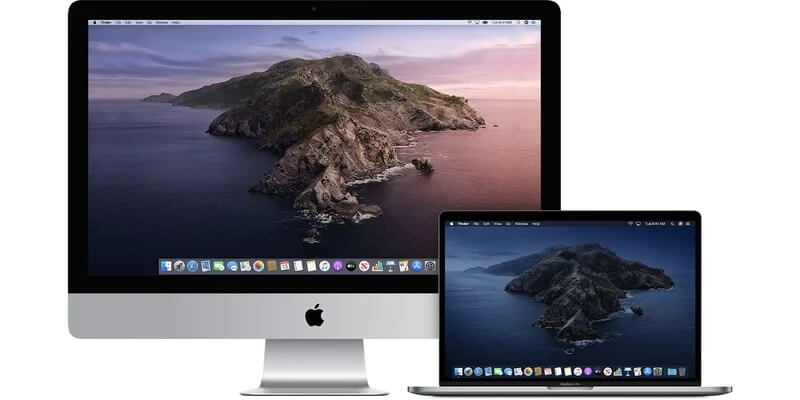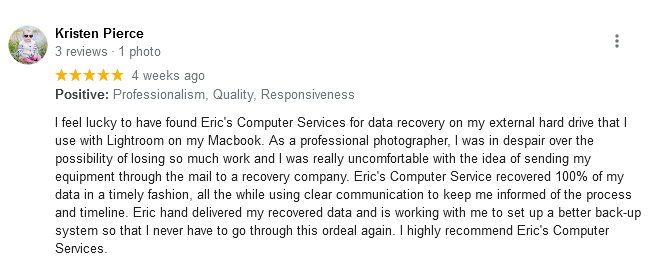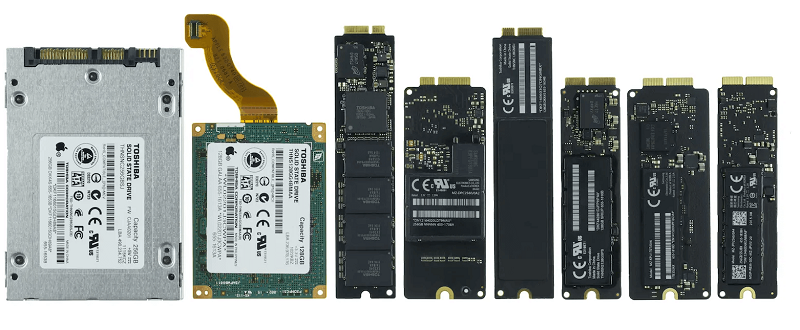Apple Mac Data Recovery Services
Eric’s Computer Services has been providing Apple Mac data recovery services in the Capital Region for more than a decade. I specialize in data recovery from logically and physically failed Apple Devices such as the Apple MacBook, iMac, Mac mini, and Mac Pro. I offer hardware recoveries and have specialized software utilities for getting data back on macOS.
The nickname ‘Mac’ refers to Macintosh computers made by Apple Inc. based in Cupertino, California. With its very first model in 1984, Apple is largely credited with starting making home computers that are easy to use and promoting the amazing MacBook laptops in recent years. Macs are particularly popular with photographers, creators, educators, students, and web designers.
MacBook, iMac, Mac mini, and Mac Pro Recovery Experts
Apple users love their devices. Over time, Macs become more than just computers; they store family pictures and important data. Often, people know nothing about data recovery from until they are seeking it for the first time for their Apple device. Usually, it is when their storage devices stop working.
Professional data recovery services are now available.
Data Loss Situations
Many data loss scenarios may happen base on user error, accidental deletion, hardware failure, logical issues, malware, or even having a drive dropped. Usually users don’t even notice the warning signs of an impending drive failure. Whatever the reason of the failure is, suddenly you may find yourself requiring professional help to recover data from your Mac.
I have the capability to recover data from all kinds of Apple file systems including MFS, HFS, HFS+, HSFX in addition to MAC formatted external hard drives.
Eric’s Computer Services is the first call a Mac user should make in the event of a data loss or hard drive failure. I am often referred by the Apple store in Albany to recover data before their experts work on fixing a physical issue with a Laptop, iMac or MacBook.
Signs of a failing hard drive in a Mac computer can include difficulty mounting the drive, displaying a grey envelope, errors in Disk Utilities, files/folders/partitions disappear mysteriously, or an OS that freezes or does not boot when you turn on your computer on. As Certified Data Recovery Expert I am here to help.
Adobe Lightroom, Photos for macOS, iPhoto, and Recovery of Pictures
The biggest thing home users and Apple users are looking for is the recovery of pictures and video.
Adobe Lightroom is a fantastic photo software that keeps your images organized and accessible. Photos for macOS have replaced the previously popular photo software iPhoto. Whether you are using or have a drive with Adobe Lightroom, Photos for macOS, iPhoto, or another software I can help. Due to various issues, data loss of photos can happen. Mac updates can cause photography libraries to go missing or issues at a hardware level can cause problems.
Apple Laptop and Desktop Models for Recovery
- Apple MacBook, MacBook Pro, MacBook Air
- Apple iMac, iMac Pro
- Apple Mac Pro
- Apple Mac mini
- Apple Mac Studio
- Apple Time Capsule
Apple Data Recovery for macOS and OSX operating system including
macOS
- macOS Monterey 10.12
- macOS Big Sur 10.11
- macOS Catalina 10.15
- macOS Mojave 10.14
- macOS High Sierra 10.13
- macOS Sierra 10.12
OSX
- OS X 10.11 El Capitan
- OS X v10.10 Yosemite
- OS X v10.9 Mavericks
- OS X v10.8 Mountain Lion
- OS X v10.7 Lion
- OS X v10.6 Snow Leopard
- OS X v10.5 Leopard
- OS X v10.4 Tiger
- OS X v10.3 Panther
- OS X v10.2 Jaguar
- OS X v10.1 Puma
- OS X v10.0 Cheetah
Classic Mac OS
The classic Mac OS was the operating systems developed for the Macintosh family of personal computers by Apple. Starting in 1984 with System 1 and it ended in with Mac OS 9. The Classic Mac OS was succeeded by OSX.
- Mac OS 9
- Mac OS 8
- System 7
- System Software 6
- System Software 5
- System 4
- System 3
- System 2
- System 1
Recovery is offered on All Makes and Models of Apple Devices
I have over a decade of experience recovering data from all types of Apple and Mac storage, Mac file systems, and any other storage device used in a Mac machine. Whether it is a hard drive, solid-state drive (SSD), fusion drive, USB Flash Drive, SD Card or External Hard Drive that stores data on your Apple device, I can work to recover your files.
The Recovery Process
I can recover data from macOS devices that have experienced accidental deletion, lost partitions, physical damage, firmware corruption, bad read-write heads, and more. I have a high success rate in retrieving files from all drives.
I work with you to get a diagnostic of your storage drives and provide you with a price quote and estimated completion time. If you accept the diagnostics, your recovery is started. After the data is recovered, it is sent back to you on new return media along with your original drive or storage medium.
macOS Data Recovery Challenges
Apple products have a lot of things going for them from design to ease of use. For data loss, Macs don’t have much of an advantage over Windows PCs. In fact macOS (Mac OSX) data recovery is often even more complex due Apple file systems. The Apple macOS file system makes having photos in highly organized libraries making browsing and retrieval easy for the user. These libraries depend on a complicated linkage system. Also, Apple utilizes proprietary connectors and storage options like fusion drives.
Often customers are also not only seeking recovery of a whole drive and its individual files (like documents, photos, and videos). The Apple data recovery process involves the total retrieval of your library fully intact, not just the individual files.
Customers also seek backups from the macOS built-in backup software Time Machine. Retrieving Time Machine backs are a time-consuming and often complicated process.
Actual Mac Recovery Customers
Read about an actual data recovery case from a customer in Niskayuna, New York that I performed a software recovery on their MacBook Pro Early 2013 that had a 7+17 Pin proprietary connector and got back 100% of their files.
Kristen Pierce Photography
I helped Kristen from Kristen Pierce Photography from Lake George, New York get back 100% of her data.
Her Google review is glowing and states “I feel lucky to have found Eric’s Computer Services for data recovery on my external hard drive that I use with Lightroom on my Macbook. As a professional photographer, I was in despair over the possibility of losing so much work and I was really uncomfortable with the idea of sending my equipment through the mail to a recovery company. Eric’s Computer Service recovered 100% of my data in a timely fashion, all the while using clear communication to keep me informed of the process and timeline. Eric hand delivered my recovered data and is working with me to set up a better back-up system so that I never have to go through this ordeal again. I highly recommend Eric’s Computer Services.”
Stinky Dog, LLC
I help Sam from Stinky Dog, LLC in Niskayuna get 99,9% of her data back from a physically failed mac hard drive.
She was pleased and left the following on Google for a review “After a failed iMac hard drive, I was told by Apple store that I probably wouldn’t be able to recover any data. However, Eric was able get more than 99.9% data back for me. He went above and beyond to help, answer questions, and made personal deliveries to my home and business. I HIGHLY recommend his services… Thank you Eric!”
Professional Services
Eric’s Computer Services offers expert data recovery including the Apple MacBook, iMac, Mac mini, and Mac Pro. I can also work with iPhoto, and Time Machine recoveries to get your data back!
I offer our customers a variety of service options to fit their recovery needs including standard, emergency service, and no rush service.
Apple Media Types
Different Macs over the years utilize different types of media storage. Get a data recovery partner that has the experience, tools and knowledge base to retrieve your data. Eric’s Computer Services is known for recovering data from standard hard drives, standard SSD’s as well as Apple proprietary drives such as SSD’s with proprietary connectors and Fusion Drives.
-
Fusion Drive
The fusion drives are used in the iMac and Mac mini. It is Apple’s implementation of a hybrid drive. Apple’s implementation combines a hard disk drive. A hybrid drive (solid-state hybrid drive – SSHD) is a logical or physical storage device that combines a faster storage medium such as a solid-state drive (SSD) with a higher-capacity hard disk drive (HDD). Apple’s Fusion Drive design incorporates proprietary features.
-
Standard 2.5″ SSD
-
Standard 2.5″ Hard Drive
-
Standard 3.5″ Hard Drive
-
Apple Proprietary SSD, mSATA, and M.2 Drives
Pictured Left to Right: An Apple Generation 1 SSD, Generation 2B, Generation 2 2A, Generation 3 (comparable to Generation 4A and Generation. 4C), Generation 3B (comparable to Generation 4B), Generation 5B, Generation 5A.
Pictured Left to Right: Apple Proprietary SSD’s 6+12 pin, 7+17pin, 12+16 Pin, and 22+34 pin
-
-
- Generation 1 – This release used a proprietary 6+12 Pin Connector and maintained the mSATA interface that provides a speed of 6GB/s.
- MacBook Air (Late 2010 – Mid 2011) 6+12 pin
- Generation 2 expanded the blade-style drives. With the use of mSATA III interface, this drive was faster than the first generator. It utilized a 7+17 Pin connector. Gen2A drive is shorter and wider (MacBook Pro) while Gen2B drive is taller and thinner (MacBook Air).
- MacBook Pro (Mid 2012 – Early 2013) 7+17 Pin. The Gen2A was manufactured by Samsung and SanDisk for Apple.
- iMac (Late 2012 – Early 2013) 7+17 Pin. The drives used in the Late 2012, Early 2013 iMac are hybrid/Fusion Drive.
- MacBook Air (Mid 2012) 7+17 Pin. The Mid 2012 MacBook 11 inch and MacBook Air 13 inch have a slower, read-and-write speed of 2B drives capacity. Samsung and Toshiba manufactured the Gen2B drives for Apple.
- Generation 1 – This release used a proprietary 6+12 Pin Connector and maintained the mSATA interface that provides a speed of 6GB/s.
Generation 3 drives all used the 12+16 Pin connector and PCIe 2.0 x2 interface except 1TB Gen3B SSD which has PCIe 2.0 x4.
-
- MacBook Air (Mid 2013 – Early 2014) 12+16 Pin connector
- Mac Pro (Late 2013) 12+16 Pin connector
- MacBook Pro (Late 2013 – Mid 2014) 12+16 Pin connector
- iMac (Late 2013 – Late 2015) 12+16 Pin connector
- Mac mini (Late 2014) 12+16 Pin connector
- All Mid 2013 through Mid 2015 Apple computers (with a few exceptions including the MacBook Air and iMac 21.5″) 12+16 Pin connector
-
- Generation 4 all used PCIe 3.0 x4 interface except MacBook Air 11.
- MacBook Air (Early 2015 – Mid 2017) 12+16 Pin connector
- MacBook Pro (Early 2015 – Mid 2015) 12+16 Pin connector
- iMac (Late 2015) 12+16 Pin connector
- Generation 5 – All the Gen5 Solid State Drives supported the NVMe protocol and PCIe 3.0 x4 NVMe connections and utilized the 22+34 Pin connector.
- MacBook Pro (Late 2016 – Mid 2017) 22+34 Pin connector
-
Apple Marketed and Specific External Hard Drives
-
- G-Technology is a division of Western Digital and is known for their Mac external drives, RAID enclosures, and SSDs designed specifically for Apple users and creative professionals. G-Technology drives are sold by Apple directly online and at the Apple Stores.
- LaCie offers premium external hard drives, SSDs, and RAID solutions which are sold by Apple directly online and at the Apple Stores.
-






